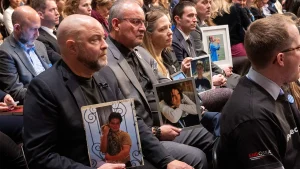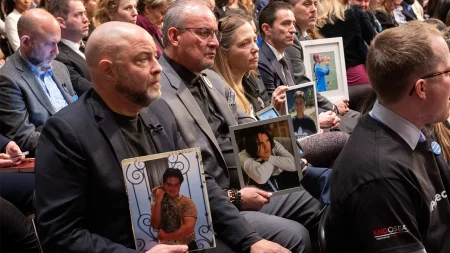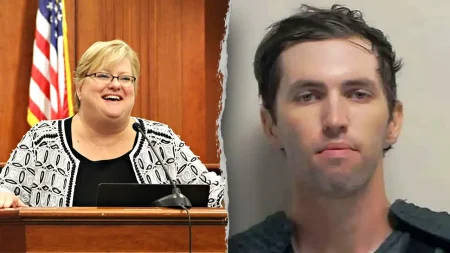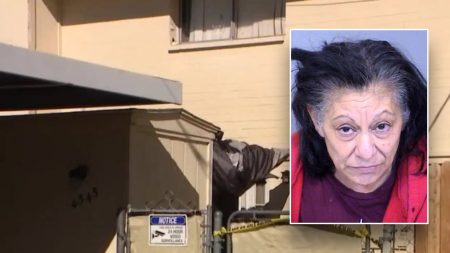Teen Driver’s Case Could Move to Adult Court After Fatal Hit-and-Run
The case of 17-year-old Vinnie Battiloro, accused of intentionally killing two teenage girls in a hit-and-run incident, has sparked public outrage as he currently faces charges in juvenile court while sleeping in his own bed rather than detention. However, legal experts suggest this situation may soon change. According to former Morris County Assistant Prosecutor Alissa Hascup, prosecutors are likely to file a waiver to transfer the case to adult criminal court, where Battiloro would face significantly harsher penalties for the two counts of first-degree murder he currently faces. “I would be shocked if the state didn’t apply for a waiver,” Hascup told The Post, explaining that such requests are typically granted unless there’s clear evidence of prosecutorial overreach. This procedural shift would dramatically alter both the public visibility of the case and the potential consequences for Battiloro.
The tragic incident occurred Monday in Cranford when Battiloro allegedly drove his Jeep deliberately into Maria Niotis and Isabella Salas, both 17, as they shared an e-bike. Police reports indicate Battiloro was traveling at approximately 70 mph when he struck the girls, with the impact so severe that one victim was found 100 feet from the point of collision. Despite the gravity of the situation, Battiloro was initially questioned and released before being formally charged and arrested on Wednesday. Adding to the controversy surrounding the case is the fact that Battiloro’s father and uncle are both local law enforcement officers, which has led some to question whether his treatment reflects preferential handling. The case has gained additional notoriety after Battiloro reportedly hosted a live stream following his release in which he spoke callously about the alleged crime.
The legal process now faces a critical juncture as prosecutors prepare their waiver application to move the case to adult court. This application will include “a written statement of reason, setting forth the facts of the case with an explanation as to how the evaluation of those facts supports a waiver for the particular juvenile,” Hascup explained. The distinction between juvenile and adult proceedings is substantial – juvenile cases remain closed to the public with outcomes kept confidential, while adult criminal proceedings are open and result in public sentences. The defense will have an opportunity to contest the waiver, but Hascup notes such challenges rarely succeed. When asked if she would represent Battiloro, Hascup responded with “a hard no,” citing the defendant’s apparent lack of remorse demonstrated in his live stream.
The current situation, with Battiloro charged but not detained, reflects New Jersey’s reformed bail system implemented in 2017. Dr. Jason Williams, a Justice Studies professor at Montclair State University, explains that it’s not unusual for juvenile defendants to be granted bail even in high-profile, serious cases. “Each decision is made on an individual basis, using current bail standards rather than relying solely on the type of charge,” Williams noted. The state’s law does require detention hearings for youths charged with serious offenses like vehicular homicide before they can be released, suggesting Battiloro’s case has already undergone some level of judicial review regarding his pre-trial status.
The families of victims Maria Niotis and Isabella Salas are left to navigate their profound grief while the legal process unfolds. The circumstances of the case – the apparent deliberate nature of the act, the high speed of the vehicle, and the devastating outcome – have intensified public attention and demands for justice. If the case moves to adult court as expected, Battiloro could face decades in prison rather than the more rehabilitation-focused outcomes typically associated with juvenile proceedings. The stark difference in potential consequences underscores the significance of the upcoming waiver decision and explains why communities affected by this tragedy are closely following developments.
This case highlights tensions within the juvenile justice system, which must balance principles of rehabilitation for young offenders against public safety and proportional consequences for severe crimes. The deliberate nature of the alleged offense, evidenced by the high speed and apparent targeting, suggests a level of premeditation that prosecutors will likely emphasize in their waiver application. Meanwhile, the community continues to mourn the loss of two young lives cut tragically short. As legal proceedings advance in the coming days, the families, friends, and community members affected by this tragedy await answers about how justice will ultimately be pursued for Maria and Isabella, whose futures were stolen in a moment of what authorities characterize as intentional violence.









